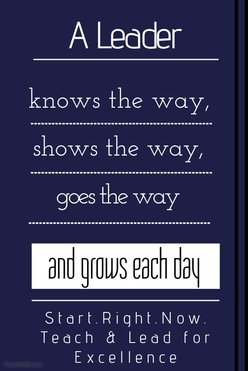 Currently, I'm reading Start. Right. Now.: Teach and Lead for Excellence by Whitaker, Zoul, and Casas, and the book and quote pictured allowed me to reflect on what I am doing on a daily basis. The start of this quote is nothing new, John C. Maxwell's words have been shared in professional literature, on motivational posters, and during conference sessions, but the authors of Start. Right. Now., added "and grows each day" to the end. By adding those four words, I felt the authors wanted to demonstrate the importance of a principal/teacher/coach viewing themselves as a lead learner. Taking time to reflect on my own work, I looked at each phrase and identified where my work fit. Knows the Way: Based on state and district initiatives, building improvement goals, student and teacher needs, and my own informal observations, I am able to identify where we are and where we need to head. Throughout the year, I set aside time to check in on the steps we as a building and myself as a coach, have taken toward meeting the goals. Based on the data and feedback, I will make changes to the course I/we are on. I am also willing to admit when I don't know something, and will reach out to my colleagues and PLN for advice or assistance. Shows the Way: So much of what I do as an Instructional Coach revolves around modeling, or showing the way. On a daily basis, I am in classrooms partnering with teachers to plan, teach, reflect, or implement an instructional practice. Along with modeling in classrooms, my actions throughout the building and district demonstrate the impact I believe our work is having. In coaching, as in other leadership areas, transparency is vital, so along with showing the way, I have to show the "why." Goes the Way: Like most adult learners, when a new district initiative, state program, or change comes around, I like to know the why behind it. This allows me to learn more about the change and grapple with how it will impact the students and teachers I serve, and most importantly how I will continue to be an advocate and ambassador for these stakeholders. Grows Each Day: Through professional readings, social media, grad classes, conferences, EdCamps, workshops, MOOCs, and my PLN I have had the opportunity to continue learning, reflecting, and growing every day. By no means am I an expert, but through the aforementioned activities, I strive to increase my knowledge, home my skills, and make a difference every day. I love to read, and I have to say, Start.Right.Now is a book I will absolutely recommend to colleagues, classmates, and anyone looking to challenge themselves as a teacher and leader!
0 Comments
Recently, I was asked what I thought the three most important tasks of instructional supervision/evaluation were. The response was to be from an Instructional Coaching lens, but as I thought about my answer, I noticed it wasn’t far off from how I would respond in one of my administration graduate classes.
My three tasks: Shared Vision, Feedback, and Reflection. Shared Vision - Cultivating a shared vision entails identifying the teacher’s (or building or district’s) current reality and together using data to inform decisions, identify and progress toward the desired state.A professor of mine once said, “If you don’t know where you’re headed, any path will lead you there” and to me, having a shared vision doesn’t do anyone any good if you haven’t thought out where you want to end up. Feedback - Feedback should be specific, grounded in data, and non evaluative when coming from an instructional coach. If it’s from an administrator, than the feedback more than likely would be evaluative. Reflection - Reflection involves employing coaching language, and allowing or encouraging teachers to reflect on their practice and choose areas for improvement. Reflection should be forward thinking, rather than dwelling on the past, or being content with how things are. Those were my three tasks, and I’m curious what your three would be. |
Archives
October 2023
Categories
All
|

 RSS Feed
RSS Feed
